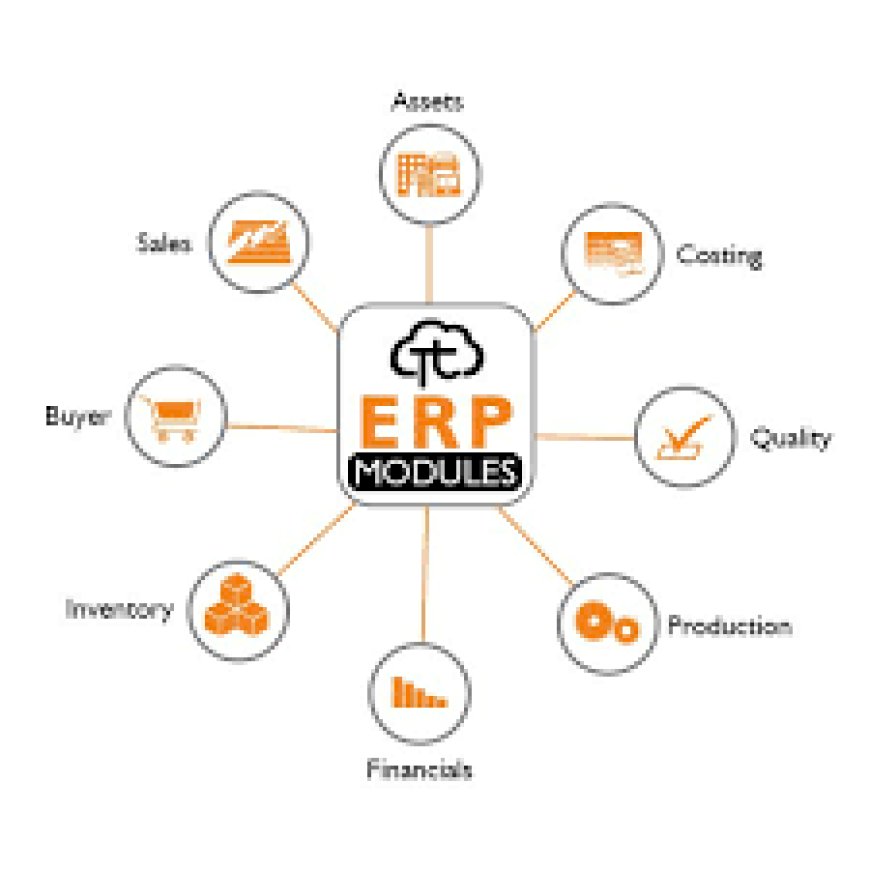ERP System: A Detailed Perspective
In simpler terms, think of an ERP system as the nerve center of your business. Instead of running finance, HR, inventory, sales, and production on separate islands of software, ERP brings them together under a unified umbrella. This unified visibility helps organizations become more agile, responsive, and data-driven.

Introduction
In todays hyper-connected global economy, businesses of all sizes face a common challenge: how to manage increasingly complex processes efficiently and seamlessly. Enterprise Resource Planning (ERP) systems have emerged as the backbone of modern digital transformation strategies. Whether in the UAE or across the world, ERP systems have become critical tools for streamlining data, automating workflows, and supporting better decision-making.
This blog will give you a deep dive into what ERP systems are, how they are transforming enterprises in the UAE, and share practical examples of successful ERP deployments worldwide. Along the way, you will see how ERP systems are evolving, what benefits they bring, what challenges to anticipate, and how to harness their full potential.
Lets get started by laying the foundation.
What is an ERP System?
Enterprise Resource Planning (ERP) is a suite of integrated applications that enable organizations to collect, store, manage, and interpret data across various business functions. It serves as a unified software solution to automate processes such as accounting, procurement, project management, risk management, compliance, and supply chain operations.
Key features of ERP systems include:
-
Integrated database for a single source of truth
-
Real-time reporting and dashboards
-
Process automation reducing manual errors
-
Scalability to match business growth
-
Centralized security and data controls
In simpler terms, think of an ERP system as the nerve center of your business. Instead of running finance, HR, inventory, sales, and production on separate islands of software, ERP brings them together under a unified umbrella. This unified visibility helps organizations become more agile, responsive, and data-driven.
ERP System: A Detailed Perspective
Lets dive deeper into the functional and technical architecture of ERP systems:
1. Core Modules
Typical ERP software offers modules such as:
-
Finance and accounting
-
Human resources
-
Manufacturing and production
-
Inventory and warehouse management
-
Customer relationship management (CRM)
-
Procurement and supply chain
2. Architecture
ERP architecture can be:
-
On-premises (traditional, hosted in-house)
-
Cloud-based (SaaS)
-
Hybrid (combination of on-premises and cloud)
3. Benefits of Unified Data
By consolidating multiple systems into one, an ERP ensures consistent data accuracy, easier compliance, and stronger internal controls.
4. Workflow Automation
With ERP, routine tasks like purchase order approvals, sales quote generation, or leave applications can be automated, freeing up staff to focus on value-added activities.
Regional Trends & Success
The ERP system in UAE has witnessed phenomenal growth over the past decade, driven by rapid economic diversification, digital government initiatives, and the rise of smart cities.
UAE-Specific Factors Driving ERP Adoption
-
Vision 2030 and similar transformation agendas
-
Demand for local language (Arabic) support
-
Compliance with UAE VAT and tax laws
-
Cybersecurity and data residency requirements
-
High rates of cloud adoption
Leading ERP Vendors Active in UAE
-
SAP
-
Oracle
-
Microsoft Dynamics 365
-
Odoo
-
Sage
Case Study Snapshot
A large manufacturing company in Dubai implemented SAP S/4HANA to connect its production, finance, and customer service processes. As a result, order fulfillment time dropped by 35% while reporting accuracy increased dramatically.
Challenges for UAE Businesses
-
Shortage of skilled ERP implementation talent
-
Balancing cultural requirements with global best practices
-
Data privacy concerns
Nonetheless, the UAE is quickly positioning itself as a regional ERP hub, with strong government backing and business incentives encouraging further adoption.
ERP System Examples: Real-World Use Cases
Real-life ERP system examples help us see the tangible benefits of this technology:
-
SAP in Coca-Cola: manages its global supply chain and bottling operations
-
Oracle in GE: supports manufacturing, finance, and logistics worldwide
-
Microsoft Dynamics in IKEA: integrates its global retail operations
-
Odoo in SMEs: affordable, modular ERP for smaller businesses
-
Infor in Ferrari: handles production planning for its luxury car lines
SME ERP Examples
ERP is not only for big players. Small businesses often use affordable, modular solutions such as:
-
Odoo
-
Zoho ERP
-
Dolibarr
-
ERPNext
These provide essential functions like inventory, invoicing, HR, and CRM without the heavy costs of enterprise-scale systems.
Benefits of Adopting an ERP System
ERP systems deliver transformational benefits, including:
? Improved operational efficiency
? Better data visibility and transparency
? Enhanced collaboration among departments
? Automated, consistent business processes
? Higher customer satisfaction
? Easier regulatory compliance
These benefits ultimately lead to higher revenue, lower costs, and a more competitive edge.
Challenges in ERP Implementation
Despite the advantages, ERP implementations can face hurdles:
?? Complex change management
?? High upfront and ongoing costs
?? Resistance to new processes
?? Data migration headaches
?? Customization needs
Many ERP projects fail because of underestimating these challenges. A thorough readiness assessment, strong leadership, and effective training are keys to success.
ERP Customization and Scalability
ERP systems are rarely one-size-fits-all. Businesses customize them to suit industry processes, legal frameworks, or even company culture.
How ERP Customization Works
-
Custom-built reports
-
Specialized workflows
-
Localization (e.g., language or currency)
-
Third-party integrations
ERP platforms also scale with your business, handling increasing transaction loads, new product lines, or global expansions.
The Future of ERP Systems: What Lies Ahead?
ERP systems are moving towards:
? Cloud-native solutions more flexible, lower hardware costs
? Artificial Intelligence automating even more decision-making
? Blockchain tamper-proof transactions for auditing and compliance
? Mobile ERP access anywhere, anytime
? Cybersecurity innovations countering increasing threats
Experts predict that within the next 510 years, most ERP platforms will integrate advanced AI tools capable of suggesting process improvements proactively. The future is truly exciting for ERP.
Conclusion
ERP systems are no longer a nice to have but a must-have for organizations striving for digital transformation. Whether you are a growing SME in the UAE or a multinational corporation, ERP systems empower you to achieve data-driven excellence, automate operations, and stay competitive.
The UAE has emerged as a leader in ERP adoption, thanks to supportive government initiatives and a dynamic economy. Global examples continue to show how powerful ERP can be when implemented thoughtfully.
The future will only make ERP systems smarter, faster, and more indispensable. If you are planning to explore ERP for your organization, now is the best time to act.
FAQs
1. What is an ERP system in simple words?
An ERP system is a software that helps businesses manage all their daily activities like accounting, inventory, HR, and sales in one place.
2. How popular are ERP systems in the UAE?
ERP systems are growing rapidly in the UAE because of government support, business incentives, and high demand for digital transformation.
3. Can small businesses use ERP systems?
Yes! There are lightweight, affordable ERP options (like Odoo or Zoho) built for small businesses.
4. What are some famous ERP system examples?
Examples include SAP, Oracle, Microsoft Dynamics, Odoo, and Infor, all used by global and regional companies.
5. How long does ERP implementation take?
Depending on the size of your business, ERP implementation can take from a few months to over a year, including training and testing.




























